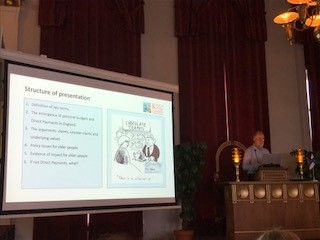 John Woolham is Senior Research Fellow at the Social Care Workforce Research Unit in the Policy Institute at King’s. He recently returned from a trip to Helsinki where he discussed the English experience of implementing personal budgets. (1,141 words)
John Woolham is Senior Research Fellow at the Social Care Workforce Research Unit in the Policy Institute at King’s. He recently returned from a trip to Helsinki where he discussed the English experience of implementing personal budgets. (1,141 words)
On 31 May of this year, the Social Care Workforce Research Unit at King’s was asked to organise a seminar on the topic of Personal Budgets and Direct Payments for a group of social care practitioners, project managers, academics and civil servants from Finland. They were over here on a ‘fact-finding’ mission. The Finnish Government is proposing to introduce a form of Personal Budgets and Direct Payments in their social care and welfare services, and the group were here to find out what they could about how they had been, and were being, implemented in England. This was a very rapid tour round the landscape. In two hours, Professor Jill Manthorpe, Dr Martin Stevens, Dr Nicole Steils and I told them about the impact of personalisation, personal budgets and direct payments on social care providers, unpaid carers and older people as well as a rapid overview of the research evidence and key issues. Surviving half-baked but well-meaning attempts by me to add Finnish subtitles to my own slides using ‘Google translate’—just don’t, OK?—we even managed to squeeze in a short discussion with questions and answers. Amazingly, after such an intense burst of information sharing, we got some extremely interesting and thoughtful questions. Although Finland was, and remains, at an early stage in the process of transforming part of its welfare services, it was clear that a great deal of thinking was being devoted to how to do this smoothly, and without the ideological rigidity that has characterised some debates around the topic in this country.
Shortly after, I received an invitation to speak at a seminar being organised by some members of the delegation. The seminar was held at the Metropolia University in Helsinki on 21 September. It represented a major milestone in a three-year programme of work funded by the EU and the Finnish Ministry of Social Affairs and Health. This programme has included the piloting of personal budgets in a number of different parts of Finland. The participants included three universities: Saimaa (South Karelia), Diaconia (a number of regions) and Metropolia (Helsinki, and which leads the study). Twenty municipalities or cities are also involved, including the cities of Hameenlinna, Vantaa, Tampere and Pori, and within municipalities, including Kainuu and South Karelia Healthcare and Social Welfare District, Finnish Foster Care Association and Helsinki Deaconess Institute.

John Woolham speaking at Henkilokohtainen Budjetointi Seminaari, Metropolia University School of Applied Social Sciences, Helsinki, Finland 21 September 2017
As the only non-Finnish speaker I was both flattered and honoured to be the first speaker. I can’t say I wasn’t concerned about how what I had to say would go down. The seminar (actually, it was really large enough to be a small conference) was entitled ‘Personal budgeting – The key to citizenship’ and the work that had been carried out by Finnish colleagues to date had been predicated on the idea that a personal budget conferred citizenship through choice—something clearly enshrined in the new Finnish Social Welfare Act. My lecture didn’t completely fit with this.
The gist of my presentation—based on published research—was that though older people in England are by far the largest consumers of social care services, as they are in Finland, they have not always been well served by Direct Payments and Personal Budgets. Almost a decade after their introduction in England, there’s no convincing evidence that all older people achieve better outcomes through having a budget. There is evidence that they can work for younger disabled people, but perhaps this should not be too surprising as control over funding is something disabled people have campaigned for over many years.
This isn’t to say, of course, that there was some imaginary golden age for social work and social care: thirty years ago it was common to expect people who needed social care help to fit in with what was available. (These days, though, it could be argued that eligibility criteria serve a similar purpose…but I digress.) The point I made was that if this new consumer led, choice driven, independence focused approach doesn’t work for some older people, it’s important to ask why and what can be done about it. A number of academics have suggested that in answer to the ‘why’ question, it’s simply because older people, in the final years of their lives, are looking for something different to being ‘restored’ to active citizenship. They don’t need help to get a job, or raise a family or complete their education (all given as examples of how budgets can help in key English policy documents): they’ve done that and got the tee-shirt. Active citizenship, as defined currently, isn’t really an option for most people who are in the final stages of their lives.
This is not to say that they don’t want choice but that they will need help to exercise it. This has led some academics to suggest that care services need to think less about care as a ‘transaction’ (easy to do with a personal budget and the discourse of ‘cash-for-care’ perhaps) and more about investing in the development of relationships of reciprocity and trust with other human beings. If this is accepted, then other things can also be re-examined. Is independence the only real goal of social care? Or do we all exist in a network of inter-dependencies with others, sometimes giving, sometimes taking?
In the event, any concerns I had about what I had to say were misplaced. The lecture seemed to be very well received, feedback afterwards was also positive and there were some really sharp and insightful questions. Were budgets large enough in England? How was it decided how much money someone should get in their budget? Were there restrictions about what the money could be spent on? Did I think personal budgets represented the introduction of neo-liberal values into care settings? Later on, I asked Finnish colleagues how they could create a viable social care market in which choice could be exercised in their county. (Finland’s population is just under 5.5 million and its territory is 338.4 km2. By contrast, the UK’s population is 66.5 million and has a territory of 242.4 km2.)
It’s too early to say what personal budgets will look like in Finland. Though one role of the project is to produce a set of workable recommendations and to create an infrastructure that will support this new approach to service delivery, whether it gets implemented, how, to what extent, over what timescales and with what resources will be decided by elected politicians. Regardless of final outcomes, I urged academic colleagues to publish their findings when they could so that their experiences and conclusions can be shared.
I left Helsinki—which, if you’ve never been, is a beautiful, friendly place and somewhere I’d like to stay for longer some time—with the hope that we will find ways to keep in touch and share information over the next few years.
John Woolham is Senior Research Fellow at the Social Care Workforce Research Unit in the Policy Institute at King’s.
References
Woolham, J., Daly, G., Sparks, T., Ritters, K., & Steils, N. (2016) ‘Do direct payments improve outcomes for older people who receive social care? Differences in outcome between people aged 75+ who have a managed personal budget or a direct payment’, Ageing and Society. DOI:10.1017/S0144686X15001531
Woolham, J., Steils, N., Daly, G., & Ritters, K. (2016) ‘The Impact of personal budgets on unpaid carers and older people’, The Journal of Social Work DOI:10.1177/1468017316654343
Woolham, J., Daly, G., Steils, N., & Ritters, K. (2015) ‘The evolution of person-centred care to personalised care, personal budgets and direct payments in England: some implications for older users of social care services’, Sociologia e Politiche Sociali, (1): 145-162 DOI:10.3280/SP2015-001008
Woolham, J. (2015) Are personal budgets always the best way of delivering personalised social care to older people? 4 page peer reviewed summary of main findings, London: NIHR The School for Social Care Research.
Woolham, J. & Benton, C. (2013) ‘The Costs and benefits of personal budgets for older people: evidence from a single local authority’, British Journal of Social Work, 43(8): 1472-1491.